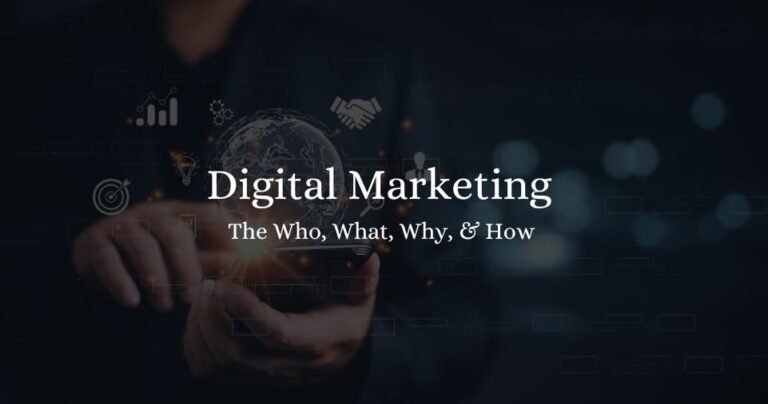Marketing in Business: Strategies and Types Explained 2023
Welcome to our comprehensive guide on marketing in business, where we will explore the strategies and types of marketing that can drive success for your organization. In today’s competitive landscape, businesses face the challenge of standing out among the noise and reaching their target audience effectively. This is where marketing plays a crucial role.
Marketing encompasses a wide range of activities aimed at promoting products, services, or brands, and it can often be overwhelming for businesses to navigate the various strategies and types available. The problem many businesses encounter is not having a clear understanding of which marketing approaches will yield the best results for their specific needs.
But fear not! In this guide, we will delve into the world of marketing, addressing the challenges you may face and providing you with the knowledge and tools to overcome them. We promise to equip you with the insights and strategies necessary to develop effective marketing campaigns that drive growth and success.
Throughout this article, we will provide an overview of various marketing strategies and types, offering practical tips and examples along the way. By exploring different approaches such as content marketing, social media marketing, search engine optimization (SEO), email marketing, and more, we aim to give you a comprehensive understanding of the marketing landscape and how each strategy can contribute to your business goals.
Now, let’s address the pain point. Picture this: your business has a remarkable product or service, but you’re struggling to reach your target audience effectively. You know you need to leverage marketing, but you’re unsure where to start or which strategies will yield the best results. This is a common challenge faced by many businesses, and we are here to provide you with the solutions and guidance you need.
With the focus keyword “marketing” at the core of our discussion, we will break down the key principles, strategies, and types of marketing to help you make informed decisions and create impactful marketing campaigns. By the end of this guide, you will have a solid foundation to develop a successful marketing strategy that aligns with your business objectives.
Understanding Marketing in Business
Marketing is the lifeblood of any business. It is the strategic process of promoting and selling products or services, creating brand awareness, and building customer relationships. In today’s digital age, marketing has evolved significantly, adapting to the changing landscape of consumer behavior and technological advancements.
The importance of marketing cannot be overstated. It serves as a bridge between businesses and their target audience, connecting the dots and conveying the value and benefits of what they offer. Without effective marketing, even the best products or services may go unnoticed, leaving businesses struggling to gain traction and generate revenue.
With the rise of digital platforms and the internet, marketing has become more accessible and dynamic. The traditional methods of print, TV, radio, and outdoor advertising still hold relevance in certain contexts, but digital marketing has opened up a whole new realm of possibilities. It allows businesses to reach a global audience, target specific demographics, and measure the impact of their efforts with precision.
Now let’s dive into the key principles that underpin effective marketing strategies:
Key Principles of Effective Marketing

Identifying target audience and buyer personas:
Before embarking on any marketing campaign, it is crucial to understand who your target audience is. This involves researching and analyzing their demographics, interests, behaviors, and pain points. By creating detailed buyer personas, you can tailor your marketing messages and tactics to resonate with your ideal customers.
Crafting compelling value propositions:
A value proposition is a unique and persuasive statement that communicates the benefits customers can expect from your product or service. It answers the question, “Why should customers choose you?” By identifying your unique selling points and clearly articulating them, you can differentiate yourself from competitors and attract your target audience.
Developing a comprehensive marketing strategy:
A well-defined marketing strategy outlines your goals, target audience, key messages, and the channels and tactics you will utilize to reach and engage your audience. It provides a roadmap for your marketing efforts, ensuring consistency and cohesion across different platforms. A comprehensive strategy takes into account your budget, resources, and the metrics you will use to measure success.
Exploring Marketing Strategies
Content marketing: Engaging and educating your audience
Content marketing is all about creating valuable and relevant content to attract, inform, and engage your target audience. It involves producing blog posts, articles, videos, podcasts, infographics, and other forms of content that align with your audience’s interests and needs. By providing educational or entertaining content, you can establish your expertise, build trust, and nurture long-term relationships with your audience.
Effective content marketing requires understanding your audience’s pain points and delivering solutions through your content. It’s about being helpful rather than salesy. For example, a fitness apparel brand might create workout tutorials, healthy recipe guides, and motivational blog posts to inspire and educate their target audience. By providing valuable content, they position themselves as a trusted resource and increase the chances of converting leads into customers.
Stay tuned as we explore more marketing strategies, including social media marketing, search engine optimization (SEO), email marketing, and influencer marketing. Each strategy offers unique opportunities to connect with your audience and drive business growth.
Types of Marketing

Marketing is a dynamic field that encompasses various strategies and approaches to reach and engage target audiences. Understanding the different types of marketing can help you determine the most effective tactics to promote your business and connect with your customers. Let’s explore some of the key types of marketing:
A. Traditional marketing: Print, TV, radio, and outdoor advertising
Traditional marketing refers to the conventional methods of promoting products or services through offline channels. This includes advertisements in newspapers, magazines, billboards, television commercials, and radio spots. While digital marketing has gained prominence, traditional marketing still holds value in certain contexts. For example, a local business might rely on radio ads or billboard placements to target a specific geographic area.
B. Digital marketing: Online channels and platforms
Digital marketing has revolutionized the way businesses connect with their audience. It leverages the power of the internet and various online platforms to deliver targeted messages and drive customer engagement. Digital marketing encompasses a wide range of tactics, including search engine optimization (SEO), social media marketing, content marketing, email marketing, and paid online advertising. The advantage of digital marketing lies in its ability to reach a global audience, target specific demographics, and measure campaign performance with accuracy.
C. Guerrilla marketing: Innovative and unconventional approaches
Guerrilla marketing takes a creative and unconventional approach to captivate the audience’s attention and create a memorable brand experience. It involves executing out-of-the-box marketing campaigns that are often low-cost but high-impact. For instance, a company might organize a flash mob in a busy shopping mall to create buzz and generate awareness for their brand. Guerrilla marketing thrives on surprise, creativity, and the element of surprise, leaving a lasting impression on consumers.
D. Relationship marketing: Building long-term customer connections
Relationship marketing focuses on fostering long-term relationships with customers rather than solely focusing on one-time transactions. It emphasizes building trust, loyalty, and customer satisfaction through personalized interactions and tailored experiences. Relationship marketing often involves strategies like customer loyalty programs, personalized emails, follow-up calls, and exceptional customer service. By prioritizing customer relationships, businesses can create brand advocates who not only make repeat purchases but also refer others to the brand.
E. Event marketing: Engaging with audiences through live events
Event marketing involves creating and organizing live events to promote a brand, product, or service. It provides an opportunity to directly engage with the target audience, create memorable experiences, and showcase the brand’s values and offerings. Examples of event marketing include trade shows, conferences, product launches, workshops, and sponsorships. By participating in or hosting relevant events, businesses can connect with potential customers in a more immersive and impactful way.
Understanding the different types of marketing allows you to tailor your strategies and allocate resources effectively. In the following sections, we will delve deeper into each type, exploring their specific techniques, benefits, and best practices. Stay tuned to discover the strategies that can elevate your marketing efforts and propel your business forward.
Also Read: What is Marketing, and What’s Its Purpose? 2023
Conclusion
Marketing plays a pivotal role in the success of any business. It is the engine that drives brand awareness, customer engagement, and revenue generation. Throughout this guide, we have explored the fundamental aspects of marketing, from understanding its definition and evolution to uncovering key principles and exploring various strategies and types. Now armed with this knowledge, you have the foundation to create effective marketing campaigns and propel your business forward.
By identifying your target audience and crafting compelling value propositions, you can position your brand in a way that resonates with your customers. Developing a comprehensive marketing strategy allows you to align your efforts and maximize your resources for optimal results. Whether you choose content marketing, social media marketing, search engine optimization (SEO), email marketing, or influencer marketing, each strategy offers unique advantages and opportunities to connect with your audience.
Moreover, we have explored the different types of marketing, from traditional approaches such as print, TV, and radio advertising to digital marketing, guerrilla marketing, relationship marketing, and event marketing. Each type offers its own set of benefits and can be tailored to suit your specific business objectives and target audience.
As you embark on your marketing journey, remember to continuously adapt to the evolving landscape and leverage emerging trends and technologies. Stay attuned to your customers’ needs and preferences, measure and analyze your marketing performance, and make data-driven decisions to optimize your efforts.
Now, it’s time for you to put this knowledge into action. Apply the insights gained from this guide to your own business or career endeavors. Experiment, learn, and iterate. Marketing is an ongoing process of refinement and growth, and by harnessing its power, you can propel your business to new heights.
Remember, successful marketing is not just about promoting products or services—it’s about building connections, creating value, and making a meaningful impact on your audience. Embrace the power of marketing, and let it be the catalyst that propels your business towards success.
FAQs
Q: Is digital marketing more effective than traditional marketing?
A: Both digital marketing and traditional marketing have their merits, and the effectiveness depends on various factors such as your target audience, industry, and marketing goals. Digital marketing offers a wide range of targeting options, real-time analytics, and the ability to reach a global audience, while traditional marketing can still be effective for localized or specific target markets.
Q: How can I identify my target audience?
A: Identifying your target audience requires thorough market research and understanding your ideal customer. Consider demographics, psychographics, and behavioral traits of your potential customers. Create buyer personas that represent your target audience segments, and use market research tools and customer feedback to refine your understanding.
Q: What is the importance of developing a comprehensive marketing strategy?
A: Developing a comprehensive marketing strategy helps you align your marketing efforts with your business goals, target audience, and available resources. It provides a roadmap for your marketing activities, ensures consistency across channels, and allows you to measure and track the effectiveness of your campaigns.
Q: How can I measure the performance of my marketing campaigns?
A: Measuring marketing performance involves tracking key metrics such as website traffic, conversions, engagement rates, click-through rates, and customer acquisition cost. Utilize analytics tools like Google Analytics, social media insights, and email marketing platforms to gather data and analyze the performance of your campaigns.
Q: What is the role of content marketing in a marketing strategy?
A: Content marketing focuses on creating and distributing valuable, relevant, and engaging content to attract and retain a target audience. It helps build brand credibility, authority, and trust, while also nurturing relationships with potential customers. By providing informative and educational content, businesses can position themselves as thought leaders and establish a strong connection with their audience.






